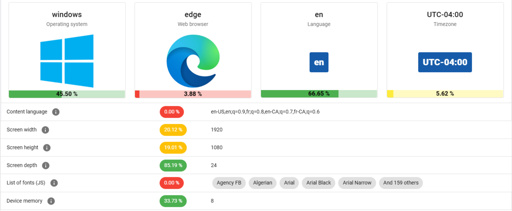Amidst the glossy marketing for VPN services, it can be tempting to believe that the moment you flick on the VPN connection you can browse the internet with full privacy. Unfortunately this is quite far from the truth, as interacting with internet services like websites leaves a significant fingerprint. In a study by [RTINGS.com] this browser fingerprinting was investigated in detail, showing just how easy it is to uniquely identify a visitor across the 83 laptops used in the study.
As summarized in the related video (also embedded below), the start of the study involved the Am I Unique? website which provides you with an overview of your browser fingerprint. With over 4.5 million fingerprints in their database as of writing, even using Edge on Windows 10 marks you as unique, which is telling.
Librewolf + uBlock Origin + Privacy Badger + containerise
For the comedy extra point, a user agent switcher can actively lie about your browser & OS.
Using a browser like Librewolf is, itself a unique identifier bc not enough people are using it.
EFF has a tool that lets you check your “uniqueness” and bc I used a lesser known browser, it was easier to track me.
Not that I mean you shouldn’t use it. I just wanted to clarify that it doesn’t make you safe from ads. :(
https://coveryourtracks.eff.org/ is the EFF tool.
My results say that I have strong protections against tracking, and that my browser is unique. It’s as good as I can get.
The agent switcher also tells the world my Librewolf on Linux is Chrome on Windows.
Thanks for linking it! I should have done that. And if LibreWolf is showing as Chrome on Windows, then you’re good!
Thanks for linking it! I should have done that. And if LibreWolf is showing as Chrome on Windows, then you’re good!
I bought a used laptop from a yard sale and only use public Wi-Fi and never use the laptop for anything with my name on it.
Pfft amateur, I break into my local Applbee’s after 2AM and use their POS terminal browser to look at used cars.
Applebee’s at 2AM which leaves a physical trail? Noob. I strap meshtastic nodes on wild dogs, using them as a Internet relay at 1-2kb a second, to look at manga leaks.
Does anyone know if Firefox’s claimed Anti fingerprinting technology is any good?
it’s useless. test it out with creepjs
I’m not looking to be anonymous, I want access to Stargate Atlantis that Amazon Prime is geo blocking from me.
For that, VPN works as advertised.
Why go through the trouble? fmhy.net
Yep. That’s how I watch F1 too.
It’s always kind of funny when the Technology folks wade into well-researched and well-worn Privacy territory.
Do you want to not wave a giant flag of your activity to Google, Meta, MS, and your ISP when you do literally anything online? Either use a VPN and Mullvad (or Librewolf, but YMMV) browser, OR a VPN and Tor OR Tor with an https bridge if paying for a VPN will make you a target (Tor bridges are not for casuals, save them for those in genuine need).
VPN locations need to be changed. Frequently. Router level VPN at home becomes your “This is me” location, then make use of VPNs on each device when you want an extra layer of obfuscation.
There’s not a lot of middle ground at this point, and it’s not difficult.
You also need to change the devices browsers, extensions and timezones to stay anonymous or buy a device and set the most common fingerprint settings, so it is harder for those companies to track you down. It is a slippery slope, and you can check your browser fingerprint and avoid adding unique settings, extensions or anything that can help them to track you.
Router level VPN at home becomes your “This is me” location
You and a thousand other people.
Yeah, but fingerprinting is effective by cross referencing.
There are 1,000 people with the IP 1.2.3.4
There are 500 people with the IP 1.2.3.4 using Firefox
There are 25 people with the IP 1.2.3.4 using Firefox with a 1440p screen
There are 2 people with the IP 1.2.3.4 using Firefox with the dark reader extension with a 1440p screen at 75Hz
etc.
So rotating the IP can screw with that.
Does that mean my ISP can still detect if I’m going to websites they don’t approve of if I’m using Mullvad as my VPN but using Firefox as my browser?
No, with a VPN the only thing your ISP sees is you connecting to a VPN server IP.
But browser finger printing, on the other hand, can identify you to every website you visit, due to info your browser hands over to every website… Such as OS version, Resolution, installed Plugins, browser settings, geolocation info, etc…which is often unique enough to identify you out of the whole of the internet.
Ironically, locking your browser down with more security features/settings/plugins often makes you more identifiable. Cause capitalism is god damned sure they are gonna track you and monetize the hell out of your information, whether its via your name, your user name, or just your digital fingerprint.
Jesus, this is scary stuff. Thanks for the link, gonna try my other browsers and devices when I get home.
Your ISP can’t tell who you are contacting if you are using a VPN, but websites will track you by other means.
Ok, cool. It was mainly my ISP I was worried about.
Would be useful for me to find a browser that obfuscated fingerprinting efforts too though.
If you use addons like Ublock-origin. You can reduce the fingerprinting. You can also disable 3rd party iframes, disable Javascript which can further reduce the data being sent to websites.
No
If the NSA wants you, they will get you. But I can hide from most of you with just a little email relay and a VPN
I can hide from everyone, I just walk into the woods.
introducing: infrared imaging

Good luck buddy.
Hey, buddy.

Remarkable! A new market nieche discovered!
Better spin up some start-ups fast! So much privacy just lies there in the forests, waiting to be sold!
The woods are where i can find people though
Those aren’t people anymore. They’re taxidermied corpses. There’s a difference.
Also, stop doing that.
I can’t stop myself
Heeeeey. Former kid, current adult, and future crazy old man here. Quick question. Do they still have 1 box of communal porn in the woods? Every woods had one when I was a kid, but I haven’t been in the woods ever since we had to kill that bear.
Just wondering if woods porn is still a thing.
Sadly, I’ve not come upon such a cache since the before times.
No, we’re more into woods erotic geocaching these days.
The only real advantage you gain is being able to watch things outside your region. Without lots of work, you’re pretty easily traceable on the modern internet.
The other major advantage is your ISP can’t build a profile on you. Considering they know who you are and where you live, that’s a pretty important air gap to me.
Most vendors are not going to trace you like that. They can, but it’s actually kind of nontrivial and not “easy.”
I’m more thinking about government. I gave up on trying to avoid ad tracking forever ago. But if you think a VPN keeps you safe posting “anonymously”, it doesn’t. That’s more what I’m referring to.
I remember in 1996 my neighbor was in one of these fancy new things on the internet called a “chat room”.
He got into an arguement with someone. It got heated. Until the other guy threatened to show up at my neighbors house.
My neighbor scoffed and laughed.
Then the guy put in my neighbors real address. To this day, that still scares me. And back then internet crime wasn’t taken seriously. In fact doxxing back then may not yet have even been a crime.
Those were the days where if you knew someone’s real name and town that they lived, you could just go and get the telephone directory for that area (the library had all of them) and look up their address and phone number. It would have to be quite a big town before you found multiple people with the same name.
FYI:
https://www.thefire.org/research-learn/doxxing-free-speech-and-first-amendment
In the US, “doxxing” laws are pretty much state-by-state and many may be violating the first amendment.
Not at all.
Do anything where you log in under one location with vanilla FF. Do everything else with 2 or more browsers under 20 other locations.
Pfft, I have 12 firewalls, good luck decrypting these. 🤓
I’ll just get 3 hackers to my keyboard, just wait.
This is why you use a separate browser for different activities and don’t cross contaminate.
Good luck I’m behind 7 proxies
That’s the point. It doesn’t matter how many middle layers there are, if you’re using a web browser, there are hundreds of pieces of information that can still be used to uniquely identify you. Do you have WebGL enabled? If so, you could be identified with 100 constantly changing proxies.
If you go to the site, what does it think of your fingerprint?
I’m here with multi-hop VPN with the first two hops staying in-country and the rest all random + a shit load of DNS blocking lists and browser extensions + blocking Google. I use different VPN providers too. I’m also introducing variable delays to my traffic to make NetFilter data less helpful.
Hops don’t matter at all against fingerprinting, which includes things like fonts you have installed, the os, os version number, browser version, extensions, some browser settings/flags, timezone, keyboard layout, your screen resolution, dpi, and what ever the crap the ”canvas” has stored. So pretty much no matter what you do, you’re unique.
You can use some browsers that resist fingerprinting but guess what, those are so rarely used that again you shine like a beacon. I’m still yet to find an browser extension that would fake all my fingerprint parameters by setting them as what is the most common one in each category. So a Windows user running latest Chrome full screen on Fullhd monitor.
And there is nothing stopping websites running the fingerprinting services and scripts on their own server, albeit most rely on third parties for convenience, and these at least can be blocked.
Some privacy browsers will randomize your fingerprint
Laughs in Tails Linux
Please understand that browser extensions make you more easy to track. I used to be under the same assumption, but uBO is as far as you should go. fingerprints include your extensions.
That depends on whether your browser exposes them, and if/how they affect your fingerprint. If you go to deviceinfo.me it will show you what your browser is exposing.
My thinking is that most of the fingerprinting is happening by third parties, and where it’s the website operators themselves I’m not super concerned about being fingerprinted.
Until someone invents real-life Intrusion Countermeasure Electronics from the cyberpunk genre, where doing shit you dont like leads them to have their equipment destroyed with electricity surge, nothing you do online is private nor is there any consequences from them enumerating everything about you to sell or use maliciously.
What a pointless article.
Does anonymous mode browsing+VPN improve this? I would think it would
Part of the reason Tor is good is because it generates the same fingerprint for all users (part of the reason you shouldn’t install additional extensions on it, by the way). Mullvad browser tries to do this but without the Tor network.
How would tor do that? As far as I understand the fingerprint is an aggregate of multiple very specific variables ie https://amiunique.org/fingerprint. Sure tor might set some (or a lot) to a default but some are very difficult to circumvent such as the rendering of specific shapes and text.
Some, but only if you’re using a very common device (i.e. Dell Latitude) with Windows. Browser fingerprinting gives up hardware specs, so hiding by blending in only works when your hardware is hard to pin down.
Use a browser that hides hardware specs, like Mullvad or Libreworlf. Even Brave is ok.
You can’t hide or get rid of the browser fingerprint, but some addons can help to randomize it so it looks like you’re using a different device every time you visit a site.
Is Firefox’s claimed Anti fingerprinting technology any good?
Personally, I don’t care if a site can fingerprint me. As long as they can’t tie that fingerprint to a rich data set.
So I make sure that each domain gets a different fingerprint response. That means that a site can validate that I’m still the same user, but any XSS attempting fingerprint based data exchange just gets garbage.
And how do you go about that? Do you adjust your window size and extensions on a site-by-site basis?




















